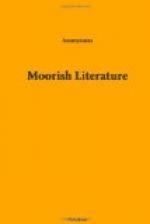Grew weary with reciting the deeds that
he had done.
To tell aright his jeopardies, escapes, and rescues wrought,
A swifter-flying pinion and a louder tongue she sought!
Such was Zulema, such was he, the warrior of renown,
The son of that Zulema who ruled Toledo’s town.
Ah! bright the fame the father left, for it shall never die—
The glory of his greater son shall keep its memory.
Now once it happened that he reached a city’s towering gate;
’Twas Avila, and there that day the games they celebrate.
The mighty square, when he arrived, was changed into a bower;
And every knight wore fluttering plumes and every dame a flower.
The scene was strange, because the Moor, in southern cities reared,
Had never seen how gay Castile on festal days appeared.
He marked the Adelifas in the King’s pavilion stand,
And he asked, and his prayer was granted, to join the champion band.
Yet when they gave consent they feared that great Zulema’s might
Would surely quite excel in joust the best Castilian knight.
But a thousand times they asked that heaven would give to him success,
And a thousand times they wondered at his glorious Moorish dress.
Full many a lady’s beck and smile were on the warrior bent,
And they looked on his manly beauty and they sighed with deep content.
But now Zulema by the hand the wardens take and greet,
And ’mid the highest noblemen they yield the knight a seat.
His seat was placed in honor ’mid ladies gay and bright,
Mid warriors of Castile, the first in courage and in might.
Then suddenly, more swift than wind, more wild than comet’s glare,
Jerama’s bull, far famed was he, rushed on the crowded square.
Ah! brave was he in flashing eyes, and fierce was he in heart,
His brow was like a storm-cloud, each horn a giant’s dart,
His wide-spread nostrils snorted fire, his neck was short and deep,
His skin was black as the thunder-cloud that crowns the mountain’s steep.
Before his coming fled the crowd, until the sunny square
Was emptied of the multitude, and every stone was bare.
Those only who on horseback sat remained to face the foe.
Now trembling with alarm they stand, and now with hope they glow.
Good sport they looked to have with him, and lay him in the dust,
But the Andalusian hero evaded every thrust.
And sometimes, with a gallant charge he threw them from their seat,
He gored them with his savage horn, and trod them with his feet!
Ah! great the shame of the vanquished knights; they dared not raise their
eyes
To the ladies who looked down and smiled from banks and balconies.
For those soft eyes were fixed no more upon each vanquished knight,
But on the monster proud and strong who conquered them in fight.
The dames upon the royal seat to Zulema turned their eyes,
To tell aright his jeopardies, escapes, and rescues wrought,
A swifter-flying pinion and a louder tongue she sought!
Such was Zulema, such was he, the warrior of renown,
The son of that Zulema who ruled Toledo’s town.
Ah! bright the fame the father left, for it shall never die—
The glory of his greater son shall keep its memory.
Now once it happened that he reached a city’s towering gate;
’Twas Avila, and there that day the games they celebrate.
The mighty square, when he arrived, was changed into a bower;
And every knight wore fluttering plumes and every dame a flower.
The scene was strange, because the Moor, in southern cities reared,
Had never seen how gay Castile on festal days appeared.
He marked the Adelifas in the King’s pavilion stand,
And he asked, and his prayer was granted, to join the champion band.
Yet when they gave consent they feared that great Zulema’s might
Would surely quite excel in joust the best Castilian knight.
But a thousand times they asked that heaven would give to him success,
And a thousand times they wondered at his glorious Moorish dress.
Full many a lady’s beck and smile were on the warrior bent,
And they looked on his manly beauty and they sighed with deep content.
But now Zulema by the hand the wardens take and greet,
And ’mid the highest noblemen they yield the knight a seat.
His seat was placed in honor ’mid ladies gay and bright,
Mid warriors of Castile, the first in courage and in might.
Then suddenly, more swift than wind, more wild than comet’s glare,
Jerama’s bull, far famed was he, rushed on the crowded square.
Ah! brave was he in flashing eyes, and fierce was he in heart,
His brow was like a storm-cloud, each horn a giant’s dart,
His wide-spread nostrils snorted fire, his neck was short and deep,
His skin was black as the thunder-cloud that crowns the mountain’s steep.
Before his coming fled the crowd, until the sunny square
Was emptied of the multitude, and every stone was bare.
Those only who on horseback sat remained to face the foe.
Now trembling with alarm they stand, and now with hope they glow.
Good sport they looked to have with him, and lay him in the dust,
But the Andalusian hero evaded every thrust.
And sometimes, with a gallant charge he threw them from their seat,
He gored them with his savage horn, and trod them with his feet!
Ah! great the shame of the vanquished knights; they dared not raise their
eyes
To the ladies who looked down and smiled from banks and balconies.
For those soft eyes were fixed no more upon each vanquished knight,
But on the monster proud and strong who conquered them in fight.
The dames upon the royal seat to Zulema turned their eyes,




